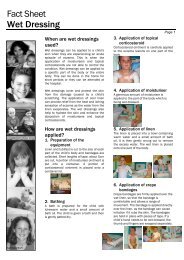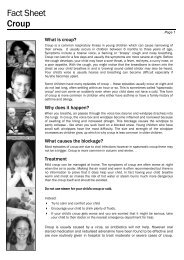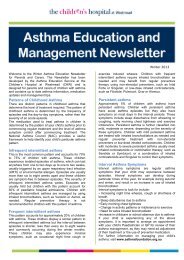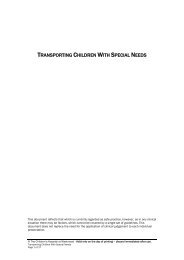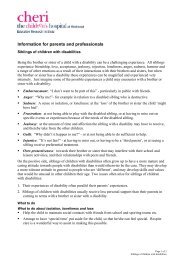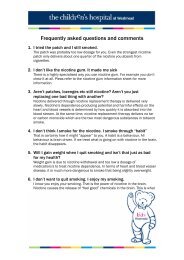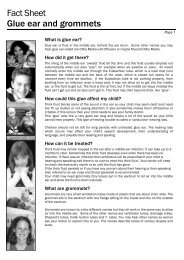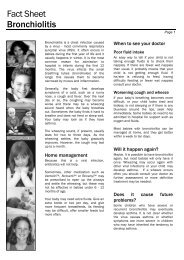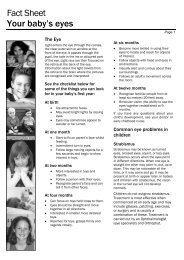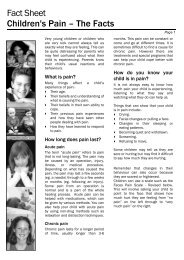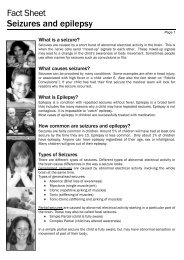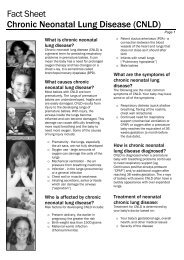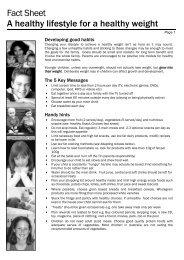Fact Sheet - Kids Health @ CHW
Fact Sheet - Kids Health @ CHW
Fact Sheet - Kids Health @ CHW
You also want an ePaper? Increase the reach of your titles
YUMPU automatically turns print PDFs into web optimized ePapers that Google loves.
<strong>Fact</strong> <strong>Sheet</strong><br />
Hearing loss in children with Down syndrome Page 1<br />
xcvxcvxcv<br />
Hearing loss is common in children<br />
with Down syndrome and if no steps<br />
are taken to minimise it hearing loss<br />
may lead to very severe language<br />
delay in these children.<br />
Do all Down syndrome<br />
children have hearing<br />
loss?<br />
Unfortunately a very large fraction of<br />
patients with Down syndrome have<br />
hearing loss either permanently or<br />
temporarily at some stages in<br />
childhood or in adult years. There are<br />
a number of causes of this hearing<br />
loss.<br />
How severe is the hearing<br />
loss?<br />
It may vary from being a mild or even<br />
a one sided hearing loss right up to<br />
profound permanent hearing loss in<br />
both ears. It may also be a<br />
fluctuating hearing loss ie, reasonably<br />
good hearing at times and poor<br />
hearing at other times.<br />
How will a hearing loss<br />
affect my child with Down<br />
syndrome?<br />
As almost all children with Down<br />
syndrome have some degree of<br />
intellectual disability, we expect them<br />
to have more difficulty developing<br />
speech than do normal children. If<br />
the child with Down syndrome does<br />
not have a hearing loss we expect the<br />
child’s ability to develop speech to be<br />
somewhat dependent on the level of<br />
intellectual ability. Therefore, if the<br />
child has only a mild intellectual<br />
disability (and no hearing loss) he or<br />
she usually develops a great deal of<br />
speech and can have a simple<br />
conversation with family or friends. If<br />
the child has a very severe degree of<br />
intellectual disability we expect the<br />
Down syndrome child to have a great<br />
deal of difficulty developing spoken<br />
language, and we may use signs<br />
and/or pictures (augmentative<br />
communication) to help us<br />
communicate with that child.<br />
However, if a child with Down<br />
syndrome has hearing loss as well as<br />
intellectual disability, unfortunately<br />
we must expect even more difficulty<br />
in developing speech, unless we treat<br />
this problem very quickly. We must<br />
constantly watch for hearing loss in<br />
any child or adult with Down<br />
syndrome. Even adults with Down<br />
syndrome can develop hearing loss<br />
for the first time in adult life.<br />
How do we know if a child<br />
with Down syndrome has<br />
hearing loss?<br />
As mentioned, a child with Down<br />
syndrome may have any degree of<br />
hearing loss from none at all to a<br />
profound loss. Permanent hearing<br />
losses in children with Down<br />
syndrome are often picked up at birth<br />
when the child has the newborn<br />
screen of hearing. However,<br />
unfortunately, many children with<br />
Down syndrome acquire hearing<br />
losses after birth and these may be<br />
picked up by behavioural testing (the<br />
“puppet” test) or play audiometry<br />
performed by an audiologist. If the<br />
child is not able to do behavioural<br />
testing, hearing can be tested (if<br />
needed) by electrophysiological<br />
testing under sedation or anaesthetic<br />
(brainstem auditory evoked<br />
responses or electrocochleography).
<strong>Fact</strong> <strong>Sheet</strong><br />
Hearing loss in children with Down syndrome Page 2<br />
xcvxcvxcv<br />
What types of hearing<br />
loss occur in Down<br />
syndrome and how do we<br />
treat them?<br />
Some children with Down syndrome<br />
may have permanent sensorineural<br />
loss and may need hearing aids from<br />
the newborn period onward. Many<br />
other children with Down syndrome<br />
have poor Eustachian tube function<br />
and small nasal passages. These<br />
children become congested, often for<br />
long periods and fluid accumulates in<br />
the middle ear (behind the ear drum).<br />
When the child with Down syndrome<br />
has to listen through this layer of fluid<br />
(which may be thick and sticky ie,<br />
glue ear) they often have at least 50<br />
decibels of conductive hearing loss.<br />
Ear, Nose and Throat Specialists may<br />
treat this hearing loss by inserting<br />
grommet tubes (often needed<br />
repeatedly). Antibiotics may also be<br />
needed. In some cases when the<br />
child repeatedly accumulates middle<br />
ear fluid, the Ear, Nose and Throat<br />
Specialist may simply request the<br />
child’s audiologist to fit hearing aids.<br />
Obviously, if hearing aids are fitted<br />
because of chronic middle ear fluid,<br />
the hearing should be tested<br />
frequently (at least once every four<br />
months) to check if the middle ear<br />
fluid is still present. An Ear, Nose and<br />
Throat Specialist will also need to<br />
check the condition of the eardrums<br />
frequently. If the child has<br />
experienced severe ear infections or<br />
if the eardrum collapses inward over<br />
the middle ear structures<br />
(atelectasis) then the ENT specialist<br />
may need to operate to correct this<br />
problem.<br />
Can a child with Down<br />
syndrome have<br />
permanent/long term<br />
conductive hearing loss?<br />
Even despite careful management,<br />
many children with Down syndrome<br />
always seem to have some degree of<br />
conductive hearing loss when tested<br />
ie, hearing loss due to problems in<br />
the middle ear. This may go on for<br />
many years and occasionally it may<br />
appear to be permanent. Rarely,<br />
there may be structural abnormalities<br />
of the middle ear in children with<br />
Down syndrome, but usually<br />
permanent or long term conductive<br />
hearing loss occurs because the<br />
mucous membrane lining the middle<br />
ear is always slightly congested or<br />
swollen, or the eardrum has become<br />
scarred or stiffer than normal. If long<br />
term or permanent conductive<br />
hearing loss occurs in children with<br />
Down syndrome hearing aids are<br />
usually very helpful.<br />
What are “mixed” hearing<br />
losses in children with<br />
Down syndrome?<br />
• Children with Down syndrome<br />
who have mixed hearing losses<br />
have some permanent hearing<br />
loss due to abnormalities in the<br />
inner ear ie, the cochlea, and as<br />
well as this permanent hearing<br />
loss, they have extra hearing loss<br />
due to problems with the middle<br />
ear. In these children, we aim to<br />
treat the middle ear problems if<br />
possible, but the hearing aids<br />
should be set to cater for the<br />
extra degree of hearing loss.
<strong>Fact</strong> <strong>Sheet</strong><br />
Hearing loss in children with Down syndrome Page 3<br />
xcvxcvxcv<br />
A fluctuating ie, variable degree of<br />
extra hearing loss often seems to<br />
make language development<br />
particularly difficult for the child with<br />
Down syndrome. If oral speech is not<br />
developing steadily in a child with<br />
mixed hearing loss, it is wise to<br />
introduce alternative means of<br />
communication to be used along with<br />
spoken words. Makaton signs,<br />
photos or picture systems may be<br />
very useful supplements to assist the<br />
development of communication. A<br />
speech pathologist or teacher of the<br />
deaf may also be very helpful to<br />
families of children with Down<br />
syndrome.<br />
Remember:<br />
• Children with Down syndrome<br />
frequently have temporary,<br />
fluctuating or permanent hearing<br />
loss. This may lead to very severe<br />
speech delay if left untreated.<br />
• Children with Down syndrome<br />
who have middle ear disease<br />
need frequent hearing tests and<br />
supervision by an ENT specialist.<br />
• Fitting hearing aids in the child<br />
with Down syndrome is often very<br />
helpful in maximising the child’s<br />
opportunity to hear well and to<br />
develop good speech. Ring<br />
Australian Hearing 131 797.<br />
This fact sheet is for education purposes only.<br />
Please consult with your doctor or other health professional<br />
to make sure this information is right for your child. This document was reviewed on 28 th May 2010.<br />
www.chw.edu.au www.sch.edu.au www.kaleidoscope.org.au<br />
© The Children’s Hospital at Westmead, Sydney Children’s Hospital, Randwick & Kaleidoscope * Hunter Children’s <strong>Health</strong> Network – 2005-2010



